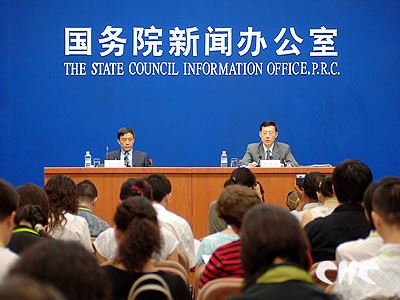| Tools: Save | Print | " target="_blank" class="style1">E-mail | Most Read |
| Economy Surged 10.9 Pct in 1st Half: Official |
| Adjust font size: |
|
China's economy surged a year-on-year 10.9 percent in the first half of 2006, the National Bureau of Statistics (NBS) revealed Tuesday, roaring ahead despite a slew of measures imposed by the government to ease investment growth. Total gross domestic product between January and June reached 9.14 trillion yuan (US$1.14 trillion), NBS spokesman Zheng Jingping told a press conference in Beijing Tuesday morning. Zheng played down the growth, saying high rates were also reported in previous years. "As for the current economic situation, generally speaking, we believe that it is fairly sound and also fairly fast," he said. Another piece of good news is that inflation remained moderate, with the key consumer price index (CPI) rising 1.3 percent from a year earlier. "The CPI was running at a fairly low level," Zheng said. But Zheng warned of high producer prices, which would put pressure on a CPI rise. He said excessive growth of investment could also ignite inflation. China's macro-economy presents "obvious overheating of investment" in the first half of this year, Wang Xiaoguang, a macroeconomics professor at the economic research institute of the National Development and Reform Commission, told Xinhua.
The NBS said total investment in roads, factory equipment and other fixed assets soared 29.8 percent, an increase of 4.4 percentage points from the same period of last year. "The overheating is all-round, in nearly all industries and all regions of the country," Wang said, urging the government to tighten macro-control to contain the trend. Tao Dong, an economist with Credit Suisse in Hong Kong, said the rebound in investment in fixed assets is a problem in China's economy. "One of the measures that should be taken to contain the overheating economy is to raise the interest rate by a big enough margin," following a moderate hike in April, said Tao. Frank Gong, an economist with JP Morgan in Hong Kong, blamed the overheating economy on the excessive money supply brought by soaring foreign exchange reserves. "The fundamental way is to accelerate the appreciation of the renminbi," he said. Some tightening measures have already been taken in the second quarter, and effects could be felt later, he said. According to the NBS, the investment in urban areas in the past six months reached 3,636.8 billion yuan, an increase of 31.3 percent or 4.2 percentage points higher, the highest growth since the second half year of 2004. Stimulated by the surging housing demand, the total investment in real estate sector increased by 24.2 percent, or 0.7 percentage point higher over the same period last year. In terms of different industries, the investment in heavy industry was up by 32.6 percent, of which the year-on-year growth of investment in coal mining and washing was a record high of 45.7 percent. The country's soaring demand for energy resources drives the investment in extraction of petroleum and natural gas up 30.3 percent in the first half of this year, and investment in production and supply of electricity, gas and water went up by 17.5 percent. While stimulated by the booming economic growth, the investment in railway transportation, the main vehicle to transport production materials in China, surged 87.6 percent in the first half of this year. In the first half, the total retail sales of consumer goods reached 3,644.8 billion yuan, a year-on-year rise of 13.3 percent, NBS figures show. Of the total, the retail sales in urban areas reached 2,461.7 billion yuan, up 14.0 percent, and the retail sales at and below country level stood at 1,183.1 billion yuan, up 12.0 percent. In terms of different sectors, the sales by wholesale and retail business totaled 3,082.1 billion yuan, up 13.4 percent and that by lodging and catering industry was 492.9 billion yuan, up 15.3 percent. Among the wholesale and retail business, the year-on-year growth of the retail sales of telecommunication equipment was 25.5 percent, and that of petroleum products was 38.4 percent. The NBS figures showed that from January to June, China's export value amounted to US$428.6 billion, up 25.2 percent year on year, or 7.5 percentage points lower than the same period of 2005. The country's import value stood at US$367.1 billion, an increase of 21.3 percent, or 7.3 percentage points higher than the January-June period of last year. By the end of June, China's trade surplus was US$61.4 billion. The nation's foreign exchange reserves climbed to US$941.1 billion, an increase of US$122.2 billion compared with that at the beginning of this year.
(Xinhua News Agency July 18, 2006) |
| Tools: Save | Print | " target="_blank" class="style1">E-mail | Most Read |
 |
| Related Stories |



